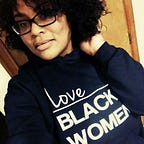Megan Thee Stallion Deserves a World That Protects Black Women
Like many Black women before her, she suffered in silence to protect others while remaining unprotected herself
Growing up I spent a lot of my formative years imagining a concept of freedom through the eyes (and music) of cisgender heterosexual Black men. I spent most of 1996–2000 rocking out to Nas’ song, “If I Ruled the World,” in which the rapper dreamed of a version of freedom where men were released from prisons, cars and raw sex were plentiful, and women like Coretta Scott King could rule cities.
This concept of freedom that Nas dreamed of in the ’90s may seem like a utopia to him, but it echoes some of the real-world problems Black women currently deal with — there is no protection or pleasure for us, only options to serve. A world without protection of Black women is not freedom. But what does a world that protects Black women even look like? And, most importantly, who do Black women need protection from?
A world without protection of Black women is not freedom.
This harsh reality hit close to home earlier this week when, on August 20, instead of celebrating the record-breaking release and success of “WAP” and her many other accolades, Houston rapper Megan Thee Stallion revealed in a two-part Instagram story what many of us in the hip-hop community already knew—that she was shot by Tory Lanez. There had been wide speculation about what happened to Megan Thee Stallion after an incident on July 12 that left Lanez in police custody and Megan hospitalized. She later revealed that she had been shot in both feet but refused to name her assailant or press charges.
For months, Meg shielded her alleged attacker from law enforcement and from public scrutiny while herself enduring ridicule and accusations of lying from the hip-hop community. In the midst of her pain and trauma, she said nothing because she knew the police were not a safe option for herself or the Black man who harmed her. Like many Black women before her, she suffered in silence to protect others while remaining unprotected herself.
It would be intellectually dishonest to dismiss this as yet another example of a Black…
